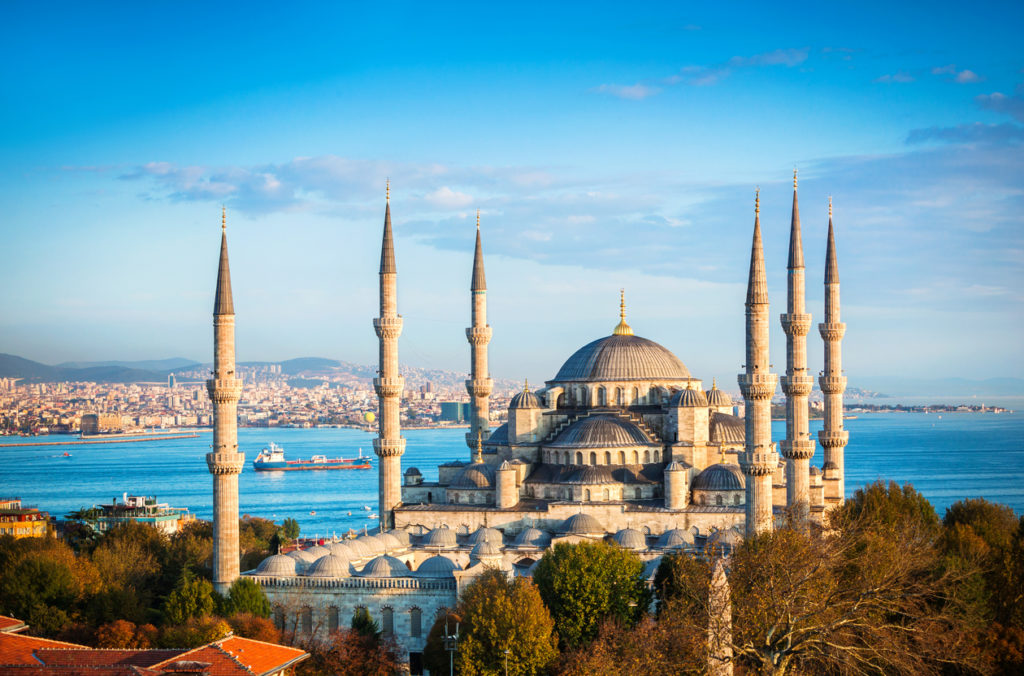- US Toll-Free:+1-888-671-5387
- International:+1-646-820-5387
- UK Toll-Free:+44-808-189-0324
- US Toll-Free:+1-888-671-5387
- International:+1-646-820-5387
- UK Toll-Free:+44-808-189-0324
- US Toll Free: +1-888-671-5387
- International: +1-646-820-5387
- UK Toll Free: +44-808-189-0324
Istanbul is the largest city in Turkey, and is the heart of the country's culture, economy and historical standing. Sitting astride the continents of Europe and Asia, and straddling the Bosphorus Strait - one of the busiest waterways in the world - this huge city (13.9 million live within city limits) serves as a major gateway of the globe. Originally founded as Constantinople and the capital of four historical empires, Istanbul is the world's tenth most popular tourist destination, thus making jet charter to Istanbul one of the most popular air charter routes worldwide.

Since the mid-1990s Istanbul's economy has been one of the fastest growing metro-regions, and with a gross domestic product of $301.1 Billion the city ranked 29th among the world's urban areas in 2011, with better than average growth predicted for the next two decades. With a diverse industrial economy focused on both high-value-add work and a growing basic manufacturing sector. The Bosphorus is also one of the busiest waterways in the world, with three times the traffic of the Suez Canal. Because of the amount of commerce that takes place in the city, business aviation to Istanbul has steadily grown over the last 10-15 years.
Istanbul is also an increasingly popular tourist destination; it welcomed 7 million foreign tourists in 2010. Istanbul is Turkey's second-largest international gateway, after Antalya. (Jet charter to Antalya is one of the most popular routes for Priority One clients.) With its past as the capital of empires, the city is one of the most important hubs of ancient culture and history globally. The Grand Bazaar, part of an even greater shopping district, is one of the oldest and largest covered markets in the world, while Akmerkez has been awarded the titles of "Europe's best" and World's best" shopping mall multiple years. Regional cuisine is world-class, with Istanbul most famous for its historic seafood restaurants. Other fine dining options, as well as all types of luxury accommodations, spas and recreational activities abound in Istanbul. The region has a borderline Mediterranean climate and humid subtropical climate, though winters are cold enough that travelers looking primarily for outdoor recreation will often choose not to visit during the winter months.
Modern art museums, including Istanbul Modern, the Pera Museum, Sakip Sabanci Museum and SantralIstanbul and other institutions like Istanbul Archaeology Museums are cultural highlights that draw visitors via jet charter to Istanbul regularly. The International Istanbul Film Festival, Istanbul International Music Festival and its most prominent event, the Istanbul Biennial also bring lots of private jet travelers each year.
Istanbul has two international airports, the larger of which is Istanbul Ataturk International Airport (IST). Ataturk Airport, located 15 miles west of the city center, handled 45.1 million passengers in 2012, making it the sixth-busiest airport in Europe and the twentieth-busiest in the world. Sabiha Gokcen International (SAW), 28 miles southeast of the city center, was opened in 2001 as a reliever airport and is also used by business and private aviation traffic regularly.
When it comes to your jet charter flight to Istanbul, Priority One Jets is ready to meet and exceed every one of your travel wants and needs. We will only work with the finest flight crews and most well-maintained private jet aircraft in the industry. Let our experienced concierge team manage all of the details of your trip, for the most relaxing jet charter experience. We have the long-term relationships and the huge network of available jet aircraft necessary to guarantee we'll always have the perfect plane for your trip itinerary, at the best possible pricing.
The city of Byzantium was established around 600 BCE, when a group of Greeks settled alongside the Bosphorus, the strait that connects the Black Sea to the Sea of Marmara and marks part of the boundary between Europe and Asia. In 324 CE, Emperor Constantine the Great founded Constantinople on the site of Byzantium to be the Eastern capital of the Holy Roman Empire. For nearly 900 years, the city prospered, first as the seat of Roman power and then, after the breakup of the empire, as the capital of the Byzantine Empire.
In 1204, after internal upheaval, Constantinople was sacked by the Christian armies of the Fourth Crusade. Though it was eventually retaken by Byzantine forces, the empire declined slowly until Ottoman forces conquered the city in 1453. Sultan Mehmed II spearheaded a campaign of rebuilding and repopulating the devastated city, which remained the capital of the Ottoman Empire until its breakup after World War I, when the modern state of Turkey was formed.
Istanbul today is a sprawling metropolis. With nearly 14 million people living within the city limits, it's the second-largest city proper in the world by population. Every year, it welcomes nearly 12 million visitors, who flock to the historic city center, as well as the cosmopolitan BeyoÄŸlu district, located across the Golden Horn, the city's natural harbor.
Must see: Sarayburnu, or Seraglio Point, is a promontory separating the Sea of Marmara from the Golden Horn that holds many of Istanbul's historic landmarks, including the famous Topkapi Palace, where the Ottoman sultans lived for four centuries. The nearby Hagia Sophia, now a museum, is one of the most magnificent cathedrals ever built.
Lodging: Pera Palace Hotel - This elegant hotel was opened in 1895 to house passengers on the famous Orient Express. It reopened in 2010 after four years of extensive renovations but retains its distinctive blend of neoclassical, art nouveau and oriental design.
Ground Transportation: Istanbul offers many transportation options, including an extensive heritage tram system. A cruise of the Bosphorus is a great way to see the city's historic skyline.
Packing Tips: Pickpockets are common in some of the more touristy areas of the city, such as the Grand Bazaar, so be sure you have a way to secure your money. Also, most public restrooms don't provide toilet paper, though they often have attendants selling travel-sized packs.
Recommended Books: Istanbul native Orhan Pamuk, winner of the 2006 Nobel Prize for Literature, has written extensively about the city. Istanbul: Memories and the City, a memoir, discusses many of the cultural shifts Turkey has undergone in recent times.
Currency: The Turkish lira is the local currency.
Calling Code Turkey: 90
Best Travel Dates: It's best to avoid July and August, both for the crush of tourists and for the occasional heatwave. Spring and fall are ideal times to visit-late March and early April tend toward the chilly side, but if you visit then, the millions of tulips planted throughout the city will be in bloom.


